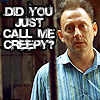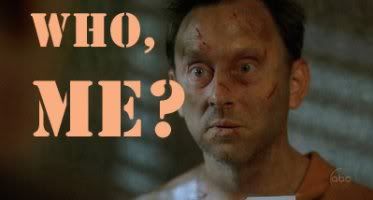|
|
Post by melissaq9 on Apr 8, 2007 21:05:46 GMT -4
Can I just say WOW?
I haven't been able to find many Zep fics and no Oliver ones, so I am very glad you put this up!
You are an amazing writer! You wove the two different stories and characters together perfectly. I love how you added little things from the movie and the show like Zep wondering what John would think about Oliver. And the puzzle at the end...priceless!
Love it!
|
|
|
|
Post by keyserzozie on May 8, 2007 3:15:35 GMT -4
After messing around with confusing links for a while, I've decided to delete my original post and re-post the story here.
Watching “Saw” and the X-Files episode “Sunshine Days” one after the other, I finally got to wondering what would have happened if Zep Hindle and Oliver Martin had ever met…
This is my second try at fanfic. It’s pretty mild, with just a little cruelty/angst.
It’s called -
POWER.
The patient had given up hope, Zep thought. Anyone could see that, though the doctors still spoke of raised electrolytes and thyroid dysfunction as if naming symptoms might address the cause, or explain the peculiar things that sometimes happened around Oliver Martin, the patient – or was he a prisoner? - in room 142.
He’d arrived some time the previous day. A shy, one might say insignificant figure – and yet, a barely-suppressed sense of excitement followed him at all times, a watchfulness quite out of proportion to his unimposing physical presence. Oliver Martin was a special case, a test subject, Zep had heard. Testing for what, no-one had said, but the man was guarded day and night by a couple of men in charcoal suits who could only, Zep thought, be FBI.
The pretty red-haired doctor in charge also looked to be FBI, and in spite of attempts to isolate the patient, to keep him away from prying eyes, rumours followed Oliver Martin, rumours that made Zep increasingly curious.
Doctors were full of it, of course. Or so his friend John always said. An interesting man – a terminal case - with a keen eye and cynical manner; alert in ways other people were not; a man who could see beneath the skin to the real truth; the grit and the guts; to the wheels that turn and the ties that bind and the look in the eye of a man who knows he’s about to die – and will do anything - yes anything – to delay the inevitable.
But Zep couldn’t talk to John right now. Zep was on a four-week exchange. A training course, they’d called it back home, though Zep knew what it really was. Over the past few months or so he’d had a few problems with the hospital administration. Nothing really serious, but according to that smug Dr Gordon, Zep wasn’t enough of a team player, and this four-week posting - to a specialist intensive-care unit in Washington – was the management’s way of putting him in his place.
One day, thought Zep, he’d pay them back. Show them a taste of who was boss. Rules weren’t just for orderlies, and no-one was untouchable.
Meanwhile, he focussed his attention on Oliver Martin, a man about whom Zep sensed that even John, who understood human nature so well, might have had a few doubts. Because Oliver Martin wanted to die, and what Oliver wanted, Oliver got – even if Oliver himself didn’t know how his ability worked, or why.
His ability. That was the phrase he’d heard them use again and again, in tones of bewilderment and awe. His paranormal ability. Power, that’s what it came to, thought Zep. The man had a power that broke all their rules - and oh, what a waste, Zep had thought, as he’d watched the patient fading fast, a pale and defenceless ghost of a man among the many drips and machines that monitored his body’s decline. Oh, what a waste of all that potential.
Zep understood potential, of course. They thought he was just an orderly, but if they’d known half of what he knew –
That, of course, was impossible. Orderlies were there to take orders, and not to have opinions. That had been made very clear to him, and he knew better now than to step out of line. But he couldn’t help hearing the rumours, could he? Rumours of strange happenings, of phantom voices heard at night, or of things that apparently shifted of their own volition whenever the patient was distressed – a glass, a book, and lately a cup of green hospital Jell-o that Dave, the last orderly to enter his room, had tried, a little too forcefully, to persuade the ailing man to eat –
“I mean, it was creepy,” Dave had said. “One minute I’m trying to feed him, yeah? And then suddenly – wham! I’m telling you, man. I know what I saw. That cup went straight through a two-inch suspended plasterboard ceiling and ended up in a roof space fifty feet above his head-” At this point Dave had shaken his own head in perplexity. “I tell you, the guy is creepy,” he’d said. “And the worst of it is he looks so scared. Helpless, you know, like a little kid -”
Well, that was certainly true, thought Zep. He must have been close to Zep’s own age, but there was something peculiarly childlike about Oliver Martin, a passive quality coupled with an intense and painful vulnerability. Then there was his unnatural stillness, as if he were reluctant to displace even the air about him - for fear, perhaps, of the consequences.
Dave had called it “creepy”. But to Zep, it made him - interesting.
Easy enough to change shifts. Easier still, now word had got round, to assume the less-than-popular job of tending to the man in room 142. It wasn’t such a difficult task. Oliver Martin didn’t say much, but at least he showed a certain respect - he always called Zep Mr Hindle, and always thanked him for his help. Between tests, he mainly slept – and the orderly found himself looking in on the sleeping patient rather more often than was necessary, just watching the restless REM patterns of Oliver Martin’s eyes under their bruise-blue lids, listening for the sound of his breathing and waiting for–
Well, that was the question, wasn’t it?
That morning, however, at breakfast time, Oliver Martin wasn’t asleep. He was sitting up when Zep came in, and the sunlight that shone through from the open blinds made his pale skin look paler still. In his blue-and-white striped pyjamas he looked more like a little boy than ever, in spite of the shadows around his eyes.
“Good morning, Mr Hindle,” he said, glancing at the breakfast tray. His voice was not entirely steady, and he consciously seemed to avoid Zep’s gaze, as if he feared he’d done something wrong.
Zep smiled. “It’s just milk. I know you’re not a Jell-o fan.”
Oliver turned his face away.
“You know, I’m not a doctor,” said Zep, “but if you don’t eat, you’re going to die.”
Oliver Martin just sighed.
“Come on. Just a little sip.”
The cup of milk gave a single shudder, as if at a tremor in the floor. Zep felt a sudden thrill run through him– the thrill that comes with secret knowledge.
He moved a little closer. “Drink up.”
Oliver Martin shook his head. “Mr Hindle. Leave me alone.”
“Or what? You’ll throw it through the roof?”
Oliver looked at him. “Please. Don’t laugh. Things –bad things - happen – when I’m around.” Once more he looked away, looking so forlorn that Zep felt an unexpected stab of pity. It wasn’t a feeling he often experienced – as an orderly in a terminal ward, he couldn’t afford emotional involvement with patients – but he felt a kinship with this man, a bond he barely understood.
“You look a bit like him,” Dave had said. “You’ve both got the same kind of eyes.”
Zep considered that for a time. He didn’t see it himself, but maybe Dave had a point. There was something linking them both, he thought, something more than their similarities in age and colouring. To Zep it felt a little uncomfortable, like watching himself from a video taken thirty years ago. In those days he’d been defenceless, too; pushed around from one foster family to the next, one school to the next with no regard for how he felt. Perhaps, he thought, that was why he’d ended up working in a hospital. To gain back some measure of control.
“What do you mean, bad things happen?”
“Some people got hurt. I mean - they died.”
That explained the presence of the FBI. Zep had an instinctive mistrust of the police – in fact, of any kind of authority. He felt a brief, involuntary thrill of admiration for Oliver Martin, who had gotten away with murder, mixed with a growing contempt for his emotional frailty.
“That doesn’t mean you deserve to die.”
Oliver Martin hung his head.
“I heard you had a - gift,” said Zep.
“Gift means poison in German. Did you know that?” said Oliver.
Smiling, Zep shook his head.
“You can’t imagine what it’s like,” Oliver went on miserably. “You don’t understand how bad it is. To be alone all the time. To have to stay away from people. To be afraid of even going outside, in case -” He sounded very close to tears - “In case – something – else - happens.”
“How does it work?” said Zep. His interest in this patient had grown so that now he felt almost dizzy with it. That power, he thought. He had to see it. Whatever it cost him, he had to know. He moved in closer to the bed. “Show me. Show me what you do.”
“I can’t,” said Oliver.
“You can. You will.” Zep grabbed hold of Oliver’s wrist. “Show me,” he said, and tightened his grasp.
Oliver flinched and screwed his eyes shut, as if to deny the outside world.
Zep, who remembered being bullied at school, once more felt a mixture of pity and contempt. But this was important. He had to know. He had to experience that power. Besides, it was strangely thrilling to be in control, to impose his own authority -
He gave the wrist a sharp wrench, so that Oliver Martin opened his eyes and looked imploringly into his. “Please. You’re hurting me -” said Oliver.
“Then fight back,” Zep told him harshly. “Don’t be a victim. Do what you do.”
For a moment they stayed motionless, the patient and the orderly, faces only inches apart. Oliver grimaced in distress. A spark of static jumped from his sleeve. Then his eyes grew suddenly wide, and he stared at the orderly in alarm.
“Don’t do it,” he said urgently. “I know you’re not a bad guy. Don’t play them. Don’t play his games -”
“Games?” said Zep.
“You know,” he said. “Please, Mr Hindle – ah! – my wrist -”
And now Zep thought he heard a sound, a high, tense, whining sound like some occult machinery set into motion. The hairs on his arms stiffened abruptly, the ground gave a shudder and the air seemed to crackle with a sudden charge –
But the real change was in Oliver Martin. He still looked pale and drained, thought Zep, but that anguished look was totally gone, replaced by a cool and measuring stare.
“I said please,” said Oliver.
And at the same time Zep felt a push, something like a hammer of hot steam that kicked him in the solar plexus and sent him flying backwards across the room. That power, he thought to himself just as the back of his head hit the wall. Oh, to have a power like that – what couldn’t – what wouldn’t I do?
And then he passed out in a blaze of light, and when he awoke 24 hours later it was to find himself in a different ward, with an inch-thick bandage around his head and a pretty nurse offering him Jell-o (not green, this time, but fluorescent orange) from a plastic cup –
His bandaged head ached thickly. “Where’s Oliver?” he said.
“Oliver Martin?” said the nurse. “Oh, he was transferred yesterday. He said he was sorry. He asked after you. He sent you this -” And she reached under her chair and handed him a flat, wrapped package. “He said it might help to pass the time. He said he hoped you’d understand -”
But Zep was already tearing at the paper and string that surrounded the gift. A tremendous excitement was growing in him. A gift from Oliver Martin, he thought. Whatever it was, it had to be significant. Perhaps the man had left him a sign; some token of that power of his, something to start him on his way -
But inside the parcel there was nothing but a flat, square cardboard box with a colourful picture on the lid. Zep put his hand to his aching head. Opened the box and swore to himself.
“What is it?” said the pretty nurse, turning to look at the pieces spilled out over the coverlet.
Zep shook his head in disbelief.
“A jigsaw -?”
|
|





